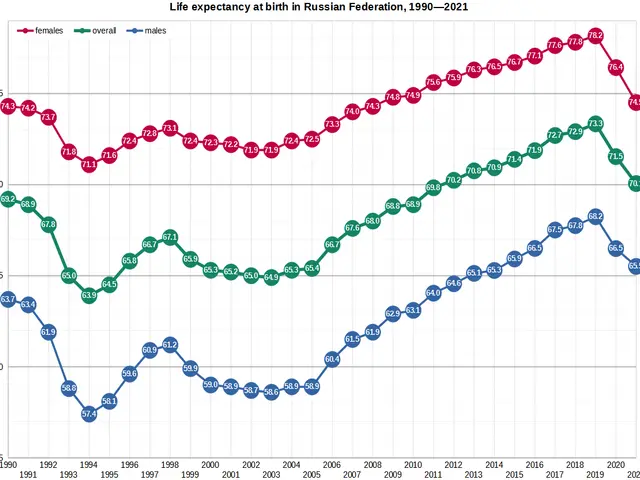Following the political hiatus during the summer, proposals concerning pensions will resume
German politics is currently on a parliamentary summer recess, but the debate surrounding pension reform continues to heat up. The proposed measures for active pension and early retirement pension are being critically viewed by experts, with concerns about their financial sustainability and fairness.
The DIW Berlin (Deutsches Institut für Wirtschaftsforschung) and the Bundesbank have expressed their concerns about the long-term viability of the pension system in Germany, highlighting challenges posed by demographic changes and the distribution of burdens across generations.
One of the key concerns raised by the DIW Berlin is the need for a specific reform element called the "Boomer-Soli," a solidarity surcharge on all retirement incomes aimed at redistributing within the older generation to stabilize the pension system without increasing the burden on younger generations. They criticize past pension policies for failing to build sufficient financial reserves, warning that when the large baby boomer cohort retires, the pension system will face significantly greater pressure. The DIW stresses that it would be unfair to place the primary costs of demographic aging on younger people and supports the Boomer-Soli as a moderate, targeted approach that mainly affects well-off retirees.
While the Bundesbank is a recognized research entity contributing to economic studies related to pensions, explicit detailed criticisms or concerns about active pension reform from the Bundesbank were not found in the accessible search results. However, given its role, the Bundesbank typically emphasizes fiscal sustainability and the need for structural reforms to maintain the viability of social welfare systems like pensions.
Chancellor Friedrich Merz considers the active pension as a crucial component of pension reform, and Minister of Labour Barbara Bas (SPD) has presented her draft law for the long-term stabilization of pensions in the federal cabinet. Despite this, the reform of pensions is facing criticism and the question of whether it is "going in the wrong direction."
The Bundesbank's concern is that the active pension measure may not significantly relieve the pension system as a whole, and minor effects can be expected in promoting employment beyond the statutory retirement age through tax incentives. Additionally, those who want to work longer anyway may take the benefits of the active pension, but the overall pension system may not be benefited.
After the recess, plans for pensions are to be further implemented. As the debate continues, it is essential to address the concerns raised by the DIW Berlin and the Bundesbank to ensure a fair and sustainable pension system for all generations.
[1] DIW Berlin (2021). Boomer-Soli: Eine faire Alternative zum Altersrente (Accessed: 2022-08-01)
Read also:
- A Business Model Explained: Its Purpose and Benefits for Your Venture
- Deep-rooted reinforcement of Walkerhughes' acquisitions through strategic appointment of Alison Heitzman
- Unchecked Management of HP Dams Leads to Environmental Disaster: RTI Reveals
- Nordstrom taps prominent New York residents for their second advertising campaign in the city.




